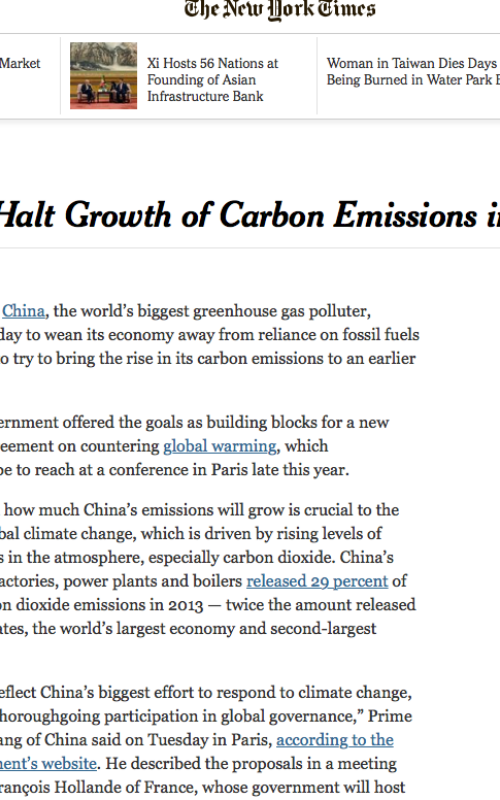Media coverage
Share


E&E News
New analyses are giving mixed grades to the most recent greenhouse gas emissions targets submitted to the United Nations, with particularly low marks for the pledge from South Korea.A new study by the Climate Action Tracker (CAT) -- a consortium of scientists and energy modelers -- declared South Korea's pledge to cut emissions 37 percent below business-as-usual levels by 2030 "inadequate." That target ultimately was more ambitious than ones the Korean government initially considered, but CAT analysts said it is still consistent with a global temperature rise between 3 to 4 degrees Celsius by 2100.

Clean Technica
The Republic of Korea (South Korea) is one of the 44 countries that have submitted emissions pledges to the official United Nations INDC list. South Korea is one of the fastest growing emitters in the developed world. Although Ban Ki-Moon, the UN Secretary-General, and US Secretary of State John Kerry have both endorsed (and praised) the South Korea INDC, others are unconvinced it will be very effective.

The Hankyoreh
Climate Action Tracker (CAT), a Europe-based organization that assesses and analyzes climate policy, rated the Intended Nationally Determined Contributions (INDC) that the South Korean government submitted to the UN on as June 30 as being “inadequate.” This is the lowest grade on a four-point scale that includes “role model,” “sufficient,” “medium,” and “inadequate.”
Since this is the first time that a major climate policy assessment and analysis organization has assessed South Korea’s INDC, it is likely to affect the assessment that will take place during future climate change negotiations in the international community.

RTCC
Climate Action Tracker, a coalition of four leading research bodies, gives China's INDC a “medium” grade for most of its national climate policies but "inadequate" for carbon intensity.

Clean Technica
The Republic of Korea (South Korea) is one of the 44 countries that have submitted emissions pledges to the official United Nations INDC list.
[...] critics find the plan wanting for the same reason the deeply researched Climate Action Tracker ranks it “inadequate.” South Korea’s proposed target is not in line with an approach considered fair to all in order for the world to reach a 2°C threshold.

Climate Action Tracker
Ethiopia has submitted its INDC (Intended National Determined Contribution) on the 10th of June. It contains the goal to limit greenhouse net gas emissions including emissions or removals from land-use, land-use change and forestry (LULUCF) to 145 MtCO2e by 2030. This represents a reduction of at least 64% below the Ethiopian business-as-usual (BAU) scenario by 2030, where net emissions are projected to reach 400 MtCO2e. The corresponding GHG emission target for 2030 excluding LULUCF is -40% below BAU, or 185 MtCO2e, which is the level used to rate the emission reduction target. The INDC implementation is conditional to support in terms of finance, technology transfer and capacity building. We rate this mitigation target “Sufficient”.

Caribbean Climate
2015 is a critical year for the Green Climate Fund as the Fund is set to finally start running its operations, bringing to life the mechanisms that the Board has been designing over the past three years.
In light of this, Climate Analytics' Felix Fallasch and Bianka Kretschmer comment on the GCF's policies on coal.

Blue and Green Tomorrow
The two largest emitters of greenhouse gases, China and the US, are among the countries that have unveiled climate change plans in recent days. The growing number of commitments to tackle the issue suggests that a global climate change agreement can be reached at a UN summit later this year. South Korea also announced its intention to cut emissions by 37% by 2030, a stronger target than was expected. The Climate Action Tracker, previously labelled South Korea’s four options for climate change as “inadequate”. It argued that all the proposed options were less ambitious than South Korea’s 2020 pledge and would allow emissions to increases after the end of the decade.

RTCC
South Korea has announced it aims to slash greenhouse gas emissions 37% from business as usual by 2030, a tightening of previously discussed targets. These were all rated as inadequate by the Climate Action Tracker, which said they were equal to 98–146% above 1990 levels, not counting land-use change.

New York Times
China, the world’s biggest greenhouse gas polluter, pledged on Tuesday to wean its economy away from reliance on fossil fuels as it grows, and to try to bring the rise in its carbon emissions to an earlier end.
The proposals “may reflect a desire by the Chinese government to have a ‘safe’ international goal,” said Bill Hare, a senior scientist with Climate Analytics.